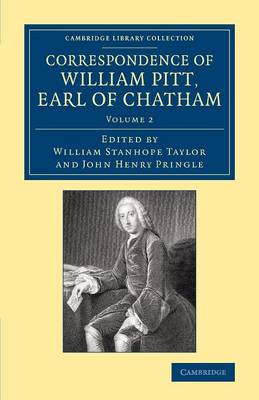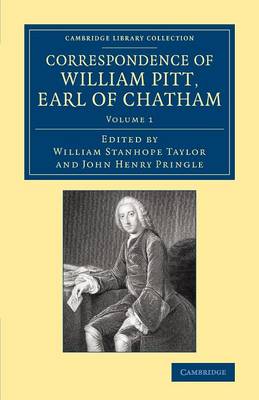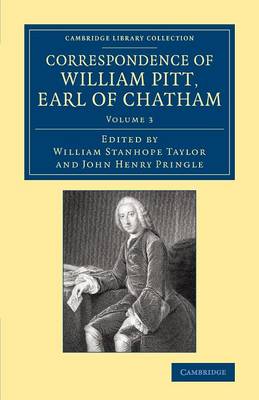Cambridge Library Collection - British & Irish History, 17th & 18th Centuries
5 total works
Famed for his masterful oratory and fearless criticism of parliamentary opponents, William Pitt the Elder (1708-78) distinguished himself through the strong leadership he provided during Britain's struggle against France in the Seven Years' War. Edited by his great-grandsons and first published between 1838 and 1840, this four-volume collection presents nearly forty years' worth of letters to and from the great statesman. Each volume also contains a useful list of the principal officers of state for the period covered, along with facsimile plates of letters and signatures by some of Pitt's eminent correspondents. Including six pre-1760 letters, Volume 2 (1838) chiefly covers the period from 1760 through to the end of July 1766. The accession of a hostile George III in October 1760 created difficulties for Pitt, which resulted in his resignation from government a year later. During his time in opposition, the Treaty of Paris concluded Anglo-French hostilities.
Famed for his masterful oratory and fearless criticism of parliamentary opponents, William Pitt the Elder (1708–78) distinguished himself through the strong leadership he provided during Britain's struggle against France in the Seven Years' War. Edited by his great-grandsons and first published between 1838 and 1840, this four-volume collection presents nearly forty years' worth of letters to and from the great statesman. Each volume also contains a useful list of the principal officers of state for the period covered, along with facsimile plates of letters and signatures by some of Pitt's eminent correspondents. Volume 1 (1838) covers the period 1741–59, although most of the letters date from 1754 onwards. Pitt's early political career saw him launch attacks on Sir Robert Walpole, contributing to the latter's resignation in 1742. Once Pitt had himself taken up the reins of power, the annus mirabilis of 1759 marked a high point of his wartime strategy.
Famed for his masterful oratory and fearless criticism of parliamentary opponents, William Pitt the Elder (1708-78) distinguished himself through the strong leadership he provided during Britain's struggle against France in the Seven Years' War. Edited by his great-grandsons and first published between 1838 and 1840, this four-volume collection presents nearly forty years' worth of letters to and from the great statesman. Each volume also contains a useful list of the principal officers of state for the period covered, along with facsimile plates of letters and signatures by some of Pitt's eminent correspondents. Volume 3 (1839) covers the period from 1766 through to November 1770. Following Rockingham's resignation in July 1766, Pitt accepted a peerage and became the Earl of Chatham, forming a new ministry that lasted until 1768. As prime minister, he was constantly troubled by longstanding health problems.
Famed for his masterful oratory and fearless criticism of parliamentary opponents, William Pitt the Elder (1708-78) distinguished himself through the strong leadership he provided during Britain's struggle against France in the Seven Years' War. Edited by his great-grandsons and first published between 1838 and 1840, this four-volume collection presents nearly forty years' worth of letters to and from the great statesman. Each volume also contains a useful list of the principal officers of state for the period covered, along with facsimile plates of letters and signatures by some of Pitt's eminent correspondents. Volume 4 (1840) covers the period from November 1770 until Pitt's death in May 1778. Despite his retirement and deteriorating health, he continued to take an active interest in politics, writing to his many correspondents on a wide range of subjects, notably the unfolding American Revolution.
Correspondence of William Pitt, Earl of Chatham 4 Volume Set
by William Pitt
Published 5 December 2013
Famed for his masterful oratory and fearless criticism of parliamentary opponents, William Pitt the Elder (1708-78) distinguished himself through the strong leadership he provided during Britain's struggle against France in the Seven Years' War. Edited by his great-grandsons and first published between 1838 and 1840, this four-volume collection presents nearly forty years' worth of letters to and from the great statesman. Each volume also contains a useful list of the principal officers of state for the period covered, along with facsimile plates of letters and signatures by some of Pitt's eminent correspondents. Volume 1 (1838) covers the period 1741-59, although most of the letters date from 1754 onwards. Including six pre-1760 letters, Volume 2 (1838) chiefly covers the period from 1760 through to the end of July 1766. Volume 3 (1839) covers the period from 1766 through to November 1770. Volume 4 (1840) covers the period from November 1770 until Pitt's death in May 1778.




